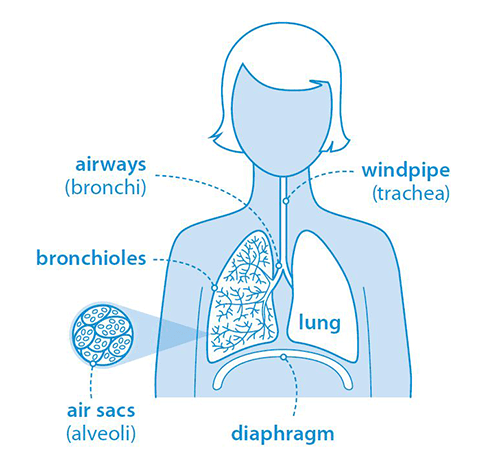Pneumonia is a type of chest infection. It affects the tiny air sacs (alveoli) in your lungs. When you have pneumonia, these air sacs get swollen and fill with fluid. This makes it harder for you to breathe.
More people get pneumonia during the winter. Most people with pneumonia can be completely cured with prompt treatment. However, pneumonia can sometimes be life-threatening, and you should take it seriously even if you’re young and fit.
What causes pneumonia?
Pneumonia is usually caused by bacteria or viruses.
- Bacterial pneumonia is most commonly caused by the Streptococcus pneumoniae bacterium, but there are other bacteria that can cause pneumonia. It usually happens when the body is weakened, for example by illness, being elderly, or lowered immunity, but it can happen to anyone. The germs that cause bacterial pneumonia can be passed on from person to person.
- Viral pneumonia is caused by viruses like influenza (the flu virus) and RSV (respiratory syncytial virus). RSV is most often the cause of viral pneumonia in children. COVID-19 pneumonia is a form of viral pneumonia that happens as a complication of COVID-19. The germs that cause viral pneumonia can be passed on from person to person.
Other types of pneumonia include:
- Aspiration pneumonia, which is caused by food going down your windpipe instead of the tube that goes to your stomach (the oesophagus), or by breathing in vomit, a foreign object or a harmful substance, like smoke or chemicals. It’s most common in people who already have a condition affecting their brain or their ability to swallow.
- Fungal pneumonia, which is caused by a fungal infection. It’s rare in the UK and more likely to affect people with a weakened immune system.
Some people get pneumonia when they are already in hospital for another condition or having an operation. This is known as hospital-acquired pneumonia. People in intensive care on breathing machines are at the most risk of developing hospital-acquired pneumonia.
Pneumonia that starts outside of hospital is known as community-acquired pneumonia.
Can you catch pneumonia more than once?
Yes. Getting pneumonia once does not protect you from getting it again. If you get pneumonia more than once, you may need to have more tests to understand why this has happened. It could be due to a problem in your chest or your immune system. Your doctor may refer you to a specialist.
What are the symptoms of pneumonia?
If you have pneumonia, you’ll have symptoms that are like having flu or a chest infection. Symptoms may come on suddenly over one or two days, or more slowly over a few days.
Common symptoms of pneumonia include:
- having a cough – your cough might be dry, or you might cough up yellow, green, brown or blood-stained mucus
- feeling weak and tired and generally ill
- feeling like you cannot catch your breath
- lack of appetite
- fast heartbeat
- sweating and shivering.
Even if you have pneumonia, you may not have all these symptoms.
You may also have symptoms like:
- wheezing
- confusion (particularly in older people)
- low blood pressure
- coughing up blood
- joint or muscle pain
- feeling sick or being sick.
Some people get a sharp pain in their chest when they breathe in and out. This is often because the thin lining between the lung and ribcage, called the pleura, has become infected and swollen. This swelling, called pleurisy, stops your lungs moving smoothly as you breathe.

The symptoms of pneumonia are often very similar to other chest infections, such as bronchitis, COPD flare-ups or bronchiectasis flare-ups. If you feel unwell with these symptoms, contact your GP or call 111.
Who is most at risk of pneumonia?
You can get pneumonia at any age. Each year in the UK, 5 to 10 in every 1000 adults get community-acquired pneumonia.
Some groups of people have a higher risk of pneumonia, including:
- babies and young children
- elderly people
- people with long-term lung, heart, brain, liver or kidney conditions
- people with diabetes
- people with cancer, especially those having chemotherapy
- people who smoke
- people who drink too much alcohol
- people with a weakened immune system. This could be because of recent illness, HIV or AIDS, or drugs that suppress the immune system.

Get support
Call or WhatsApp our Helpline for support with your condition. Get advice on your medicines, symptoms or travelling with a lung condition, or just call us to say hello.




